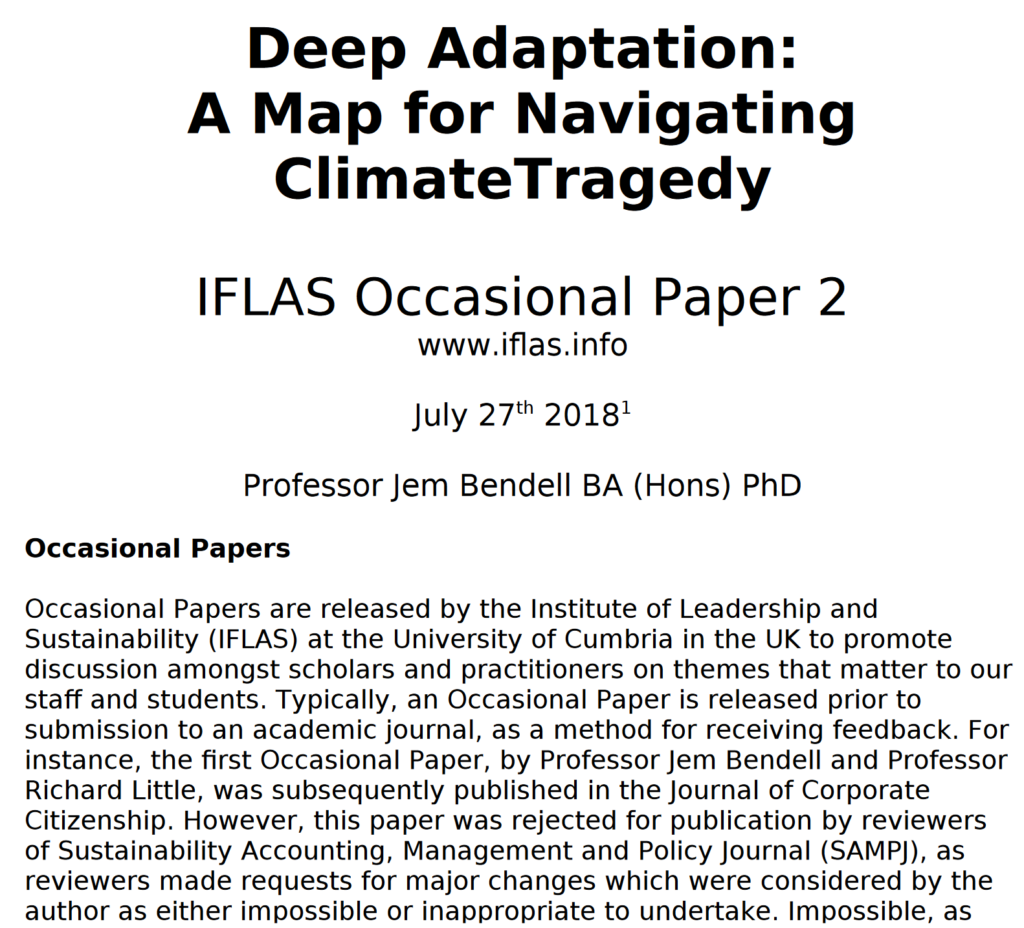The climate change paper so depressing it’s sending people to therapy

By Zing Tsjeng
27 February 2019
(Vice) – What if I told you there was a paper on climate change that was so uniquely catastrophic, so perspective-altering, and so absolutely depressing that it’s sent people to support groups and encouraged them to quit their jobs and move to the countryside?
Good news: there is. It’s called “Deep Adaptation: A Map for Navigating Climate Tragedy”. I was introduced to it via an unlikely source—a guy formerly in advertising who had left his job to become a full-time environmental campaigner. “We’re fucked,” he told me. “Climate change is going to fuck us over. I remember thinking, Should I just accept the deep adaptation paper and move to the Scottish countryside and wait out the apocalypse?”
“Deep Adaptation” is quite unlike any other academic paper. There’s the language (“we are about to play Russian Roulette with the entire human race with already two bullets loaded”). There’s the flashes of dark humor (“I was only partly joking earlier when I questioned why I was even writing this paper”). But most of all, there’s the stark conclusions that it draws about the future. Chiefly, that it’s too late to stop climate change from devastating our world—and that “climate-induced societal collapse is now inevitable in the near term.”
How near? About a decade.
Professor Jem Bendell, a sustainability academic at the University of Cumbria, wrote the paper after taking a sabbatical at the end of 2017 to review and understand the latest climate science “properly—not sitting on the fence anymore,” as he puts it on the phone to me.
What he found terrified him. “The evidence before us suggests that we are set for disruptive and uncontrollable levels of climate change, bringing starvation, destruction, migration, disease, and war,” he writes in the paper. “Our norms of behavior—that we call our ‘civilization’—may also degrade.”
“It is time,” he adds, “we consider the implications of it being too late to avert a global environmental catastrophe in the lifetimes of people alive today.” […]
Erik Buitenhuis, a senior researcher at the Tyndall Centre for Climate Change Research, tells me that Bendell’s conclusions may sound extreme, but he agrees with the report’s overall assessment. “I think societal collapse is indeed inevitable,” he says, though adds that “the process is likely to take decades to centuries.”
The important thing, Buitenhuis says, is to realize that the negative effects of climate change have already been with us for some time: “Further gradual deterioration looks much more likely to me than a disaster within the next ten years that will be big enough that, after that, everybody will agree the status quo is doomed.”
“Jem’s paper is in the main well-researched and supported by relatively mainstream climate science,” says Professor Rupert Read, chair of the Green House think-tank and a philosophy academic at the University of East Anglia. “That’s why I’m with him on the fundamentals. And more and more people are.” [more]
The Climate Change Paper So Depressing It’s Sending People to Therapy
ABSTRACT: The purpose of this conceptual paper is to provide readers with an opportunity to reassess their work and life in the face of an inevitable near-term social collapse due to climate change.
The approach of the paper is to analyse recent studies on climate change and its implications for our ecosystems, economies and societies, as provided by academic journals and publications direct from research institutes.
That synthesis leads to a conclusion there will be a near-term collapse in society with serious ramifications for the lives of readers. The paper reviews some of the reasons why collapse-denial may exist, in particular, in the professions of sustainability research and practice, therefore leading to these arguments having been absent from these fields until now.
The paper offers a new meta-framing of the implications for research, organisational practice, personal development and public policy, called the Deep Adaptation Agenda. Its key aspects of resilience, relinquishment and restorations are explained. This agenda does not seek to build on existing scholarship on “climate adaptation” as it is premised on the view that social collapse is now inevitable.
The author believes this is one of the first papers in the sustainability management field to conclude that climate-induced societal collapse is now inevitable in the near term and therefore to invite scholars to explore the implications.
None of this should come as a surprise.
“The future is a cruel hoax”
– Stephanie Mills (1969)
“The road to the future leads us smack into the wall. We simply ricochet off the alternatives that destiny offers. Our survival is no more than a question of 25, 50 or perhaps 100 years. ” Jacques Yves Cousteau (1975?)
… and many others that we never hear about.
Instead we continue polluting, overpopulating and depleting because it’s really profitable. Greed and stupidity are good for business..